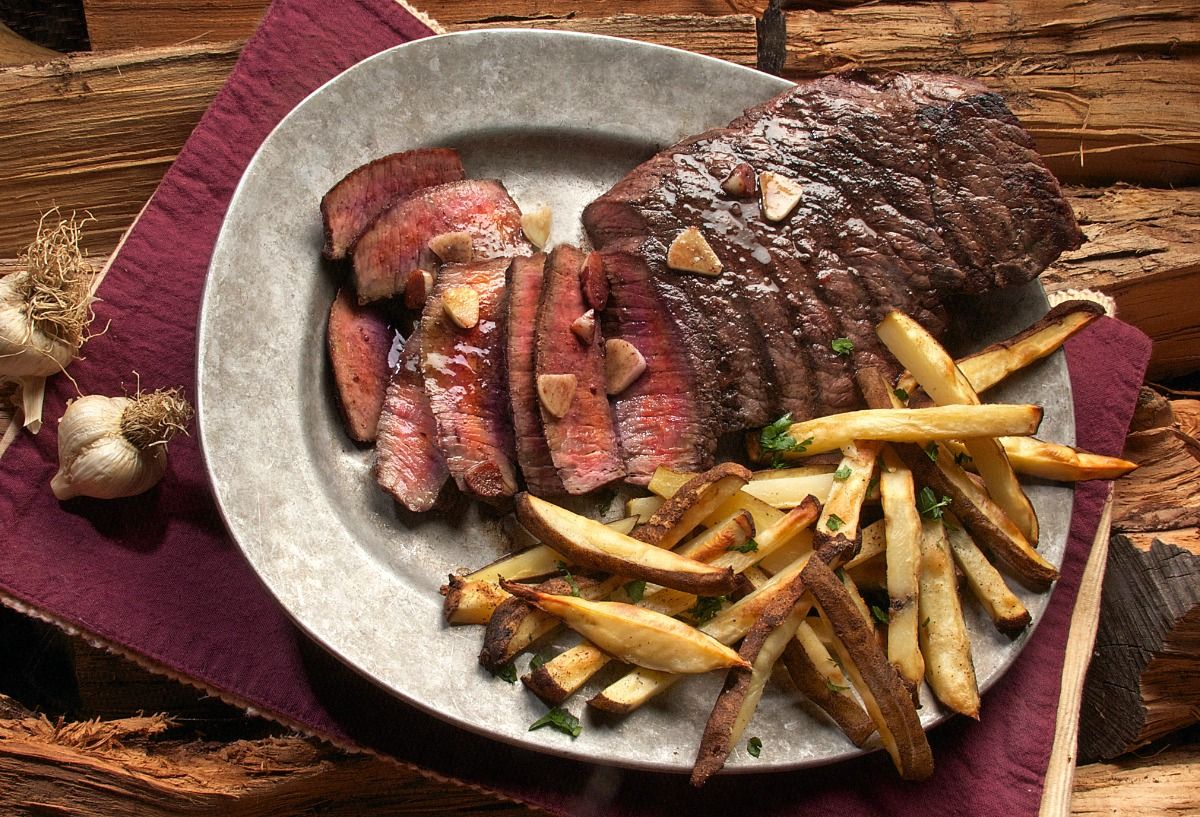
Should you be cutting out red meat or eating less red meat? Research into the effects various foods can have on our health has revealed a number of potential issues with red meat over the years. Not only can eating red meat increase your risk of heart disease and other health conditions, but eating red meat can also have a negative impact on the environment.
Ultimately, science suggests that most of us could benefit from reducing our red meat consumption. The question is, how much of a reduction do you need to consider? For some people, the best way to improve your wellbeing could be to avoid red meat entirely, thus cutting out red meat as a lifestyle change.
The Problems with Eating Red Meat
Though meat-eaters may argue red meat is delicious and an excellent source of iron, it’s far from the healthiest food you can have on your plate. (There are also many better sources of iron out there, anyway, such as spinach and raw cacao).
Even if you don’t want to be cutting out red meat from your diet entirely, you can still reduce your consumption of red meat to become a more ethical omnivore. You’ll also improve your health, and reduce your risk of long-term illnesses such as heart disease.
Compared to other meat, fish, and vegetable products, red meat contains more cholesterol and saturated fat. It’s also more likely to support the production of “TMAO”, a compound that increases your risk of arterial blood clots, heart attacks, and strokes.
For most people, the primary reasons to reduce red meat consumption will fall into two categories:
- General health and wellbeing
- Ethics and morals

Cutting Out Red Meat: The Health Benefits
Red meat does have its fair share of nutrients and benefits, but for the most part, the risks of eating red meat far outweigh the positives. You can usually get all the iron, zinc, and other nutrients you’d receive from red meat from other products, without the problematic side effects.
Excess red meat in your diet increases your risk of countless serious conditions, including cancer. Studies have demonstrated that eating red meat (particularly processed foods like bacon), is directly related to an increased risk of colorectal and stomach cancers).
Other research links red meat to diabetes, showing people who increase their consumption of beef and pork over time increase their risk of type 2 diabetes by 48%. By avoiding red meat, you can benefit from:
1.Reduced inflammation
Inflammation is a natural biological response designed to help protect your body’s tissues. Unfortunately, lifestyle choices, such as the food we eat, can cause chronic inflammation, which increases our risk of autoimmune diseases, strokes, and heart attacks.
One study found vegetarians naturally have less inflammation than meat-eaters, but omnivores can reduce inflammation by avoiding meats high in saturated fat.
2. Better digestion
The gut microbiome is the name used to refer to the countless microorganisms living in your gut, contributing to your overall health. These organisms reduce your risk for chronic diseases. However, if you’re a regular red meat-eater, you’ll be putting your gut under increased pressure.
Reducing your consumption of animal products and consuming more probiotics and prebiotics will help to get your gut back on track.
3.Lower LDL cholesterol
High levels of LDL cholesterol in the blood cause a build-up of plaque in the walls of your arteries. This increases your risk for heart disease, stroke, and heart attacks. Unfortunately, red meat is particularly high in saturated fat, a substance commonly associated with LDL cholesterol.
Plant-based diets can reduce your LDL cholesterol levels by 15 to 30%. Even if you continue to eat animal products like fish, eggs, and chicken, reducing your red meat intake will lower your cholesterol.
4.Reduced risk of Alzheimer’s
There are many factors that can contribute to a risk of developing Alzheimer’s, including the regular consumption of red meat. One study found that excessive iron accumulation in the brain can trigger the development of cognitive issues.
If a DNA test reveals you’re already at high risk of Alzheimer’s, and you discover you have a higher-than-normal level of iron in your system, it might be crucial to cut your red meat consumption.
5. Weight loss
Eating too much red meat can, unfortunately, increase your chances of gaining weight. Of course, the type of meat you eat plays a role here. Bacon and fatty burgers are more likely to cause problems than lean pork chops. However, if you’re eating around 5 ounces of red meat or more per day, you’re 27% more likely to become obese.
Switching red meat for more lean protein options (which we’ll suggest in a moment), could help you to get the summer body you’ve been dreaming of. Remember, reduced risk of obesity also leads to a lower risk of diabetes too.
6. Improved heart health
Heart disease is the world’s leading cause of death, primarily because of our dietary habits. Red meat is linked to higher cholesterol levels and blood pressure, so it naturally puts a lot of pressure on your heart. A study published in Nature Medicine found red meat can contribute to the thickening of artery walls, increasing heart problems.
Further research suggests people who eat red meat are more likely to have blood clots than those who eat non-meat protein sources, or white meat.
7.Protect your kidneys
Reducing red meat consumption can have a positive impact on many of the organs and systems throughout your body, from your brain to your heart. It also has a surprisingly strong impact on the kidneys – the natural detox system for your body.
It’s important to keep your kidneys healthy as kidney damage can be irreversible. One study published by the Nephrology society in America found a large number of people with kidney failure were also in the upper percentile for red meat consumption.
8.Potentially live longer
With so many potential negative side effects linked to red meat, it’s probably no surprise that scientists suggest eating too much red meat can significantly shorten your lifespan. Studies suggest that people consuming white meat or plant-based proteins will have a lower mortality rate than those with a diet rich in red meat.
Harvard Medical School even found that eating unprocessed red meat can increase your risk of dying prematurely by 13%, while consumption of processed red meats increases your risk level by 20%.
Why Eat Less Red Meat? Protect the Planet
If better health isn’t enough to convince you to lower your red meat consumption – how about the fact that producing red meat is bad for the environment?
Certain research papers suggest animal agriculture is responsible for around 51% of global greenhouse gas emissions. Extensive animal agricultural can also contribute to world hunger, as a majority of crops grown go to feeding animals instead of people.
Cows, sheep, and pigs generally have a more significant impact on the environment than chickens and other sources of white meat. Cows are particularly problematic, thanks to the methane gas in their stomachs. Animal agriculture even places strain on our water resources, as beef requires about 20 times more water per calorie than certain crops.
Reducing your consumption of red meat means protecting the planet, and taking a stand against ethical issues, like dangerous farming practices.

What Can You Eat Instead: Alternatives to Red Meat
It’s worth noting that a reduced intake of red meat can cause some side effects if it’s not approached properly. A DNA test can show you which minerals and vitamins you need to ensure you still have in your diet when making major changes. If you’re already low in things like zinc and B12, you may want to consider taking a supplement when changing your diet.
If you’re worried you won’t be able to find any alternatives to red meat to fill the gap in your diet – don’t panic. There are plenty of great options out there, including:
- Salmon: A high-quality protein with far fewer negative impacts than red meat, Salmon is brimming with omega-3 fatty acids to help reduce your cardiovascular risk.
- Chicken breast: If you’re not willing to go vegetarian, white meat chicken is a great way to get the protein you need with fewer calories and less saturated fat than red meat. Remove the skin for the lowest calorie intake.
- Soy protein such as Tempeh or Tofu: Tofu can taste absolutely delicious when cut into cubes and pan-fried in a yummy sauce. Similarly, the soy protein called ‘tempeh’ has a delicious nutty flavour and can be cut into cubes and used in stir frys instead of red meat. Tempeh strips can also be a delicious alternative to bacon strips.
- Cannellini beans: Cannellini beans are packed with resistant starch, which helps to stabilize your blood sugar levels and improve the performance of your metabolism. They’re also high in fibre and iron if you’re low.
- Black beans: Black bean burgers are a fantastic replacement for hamburgers. Just one patty will have a huge 11g of protein, with minimal saturated fats.
- Whole grains: Whole grains give you the carbs and fibre you need for energy, without any saturated fats to worry about. The more whole foods you get in your diet, the healthier you’re likely to feel.
One great way to start cutting out red meat is to try to avoid eating red meats on all but one day of the week. If giving up red meat is difficult for you, give yourself one ‘cheat day’ per month. For the rest of the week, look for alternative protein sources and unique recipes to help switch up your diet.
Find Out the Optimal Diet Type for You Based on Your DNA
Your DNA can tell you a lot about what diet suits you best. A CircleDNA test will provide you with 500 reports in over 20 categories, including diet and nutrition reports to help you figure out the optimal diet type for you to follow, based on your genetics.





